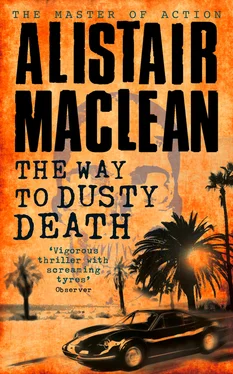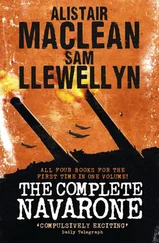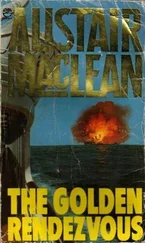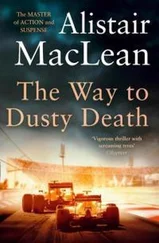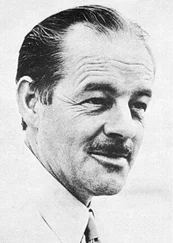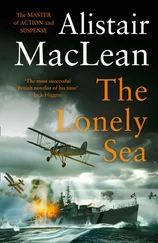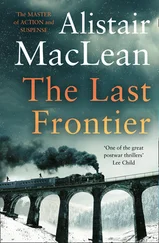Two ambulance men with a stretcher came towards them at a dead run, but Harlow, unaided except for Dunnet’s supporting hand under his upper arm, pushed himself shakily to his feet and waved them off. He didn’t, however, seem to object to what little help Dunnet’s hand lent him and they walked slowly back to the Coronado pits, the still dazed and virtually uncomprehending Harlow, Dunnet tall, thin, with dark hair parted in the middle, a dark pencil-line moustache and rimless glasses, everyone’s idealized conception of a city accountant even though his passport declared him to be a journalist.
MacAlpine, a fire-extinguisher still held in one hand, turned to meet them at the entrance to the pits. James MacAlpine, owner and manager of the Coronado racing team, dressed in a now stained tan gaberdine suit, was in his mid-fifties, as heavily jowled as he was heavily built and had a deeply lined face under an impressive mane of black and silver hair. Behind him, Jacobson, the chief mechanic and his two red-haired assistants, the Rafferty twins who for some reason unknown were invariably referred to as Tweedledum and Tweedledee, still ministered to the smouldering Coronado, while behind the car two other men, white-coated first-aid men, were carrying out more serious ministrations of their own: on the ground, unconscious but still clutching the pad and pencil with which she had been taking lap times, lay Mary MacAlpine, the owner’s black-haired, twenty-year-old daughter. The first-aid men were bent over her left leg and scissoring open to the knee wine-red slacks that had been white moments ago. MacAlpine took Harlow’s arm, deliberately shielding him from the sight of his daughter, and led him to the little shelter behind the pits. MacAlpine was an extremely able, competent and tough man, as millionaires tend to be: beneath the toughness, as of now, lay a kindness and depth of consideration of which no one would have dared to accuse him.
In the back of the shelter stood a small wooden crate which was, in effect, a portable bar. Most of it was given over to an ice-box stocked with a little beer and lots of soft drinks, chiefly for the mechanics, for working under that torrid sun was thirsty business. There were also two bottles of champagne for it had not been unreasonable to expect of a man who had just reeled off a near-impossible five consecutive Grand Prix victories that he might just possibly achieve his sixth. Harlow opened the lid of the crate, ignored the ice-box, lifted out a bottle of brandy and half-filled the tumbler, the neck of the bottle chattering violently against the rim of the glass: more brandy spilled to the ground than went into the glass. He required both hands to lift the glass to his mouth and now the rim of the tumbler, castanet-like fashion, struck up an even more erratic tattoo against his teeth than the bottle had on the glass. He managed to get some of it down but most of the glass’s contents overflowed by the two sides of his mouth, coursed down the blood-streaked chin to stain the white racing overalls to exactly the same colour as the slacks of the injured girl outside. Harlow stared bemusedly at the empty glass, sank on to a bench and reached for the bottle again.
MacAlpine looked at Dunnet, his face without expression. Harlow had suffered three major crashes in his racing career, in the last of which, two years previously, he had sustained near-fatal injuries: on that last occasion, he had been smiling, albeit in agony, as his stretcher had been loaded aboard the ambulance plane for the flight back to London and the left hand he had used to give the thumbs-up signal – his right forearm had been broken in two places – had been as steady as if graven from marble. But more dismaying was the fact that apart from a token sip of celebration champagne he had never touched hard alcohol in his life.
It happens to them all, MacAlpine had always maintained, sooner or later it happens to them all. No matter how cool or brave or brilliant they were, it happened to them all, and the more steely their icy calm and control the more fragile it was. MacAlpine was never a man to be averse to the odd hyperbolic turn of phrase and there was a handful – but only a handful – of outstanding ex-Grand Prix drivers around who had retired at the top of their physical and mental form, sufficient, at any rate, to disprove MacAlpine’s statement in its entirety. But it was well enough known that there existed top-flight drivers who had crashed or who had suffered so much nervous and mental fatigue that they had become empty shells of their former selves, that there were among the current twenty-four Grand Prix drivers four or five who would never win a race again because they had no intention of ever trying to do so, who kept going only in order to shore up the façade of a now empty pride. But there are some things that are not done in the racing world and one of those is that you don’t remove a man from the Grand Prix roster just because his nerve is gone.
But that MacAlpine was more often right than wrong was sadly clear from the sight of that trembling figure hunched on the bench. If ever a man had gone over the top, had reached and passed the limit of endurance before tumbling over the precipice of self-abnegation and hapless acceptance of ultimate defeat, it was Johnny Harlow, the golden boy of the Grand Prix circuits, unquestionably, until that afternoon, the outstanding driver of his time and, it was being increasingly suggested, of all time: with last year’s world championship safely his and the current year’s, by any reasonable standards, almost inevitably his with half the Grand Prix races still to run, Harlow’s will and nerve would have appeared to have crumbled beyond recovery: it was plain to MacAlpine and Dunnet that the charred being who had been Isaac Jethou would haunt him for however long his days were to be.
Not that the signs hadn’t been there before for those with eyes to see them and most of the drivers and mechanics on the circuits had the kind of eyes that were required. Ever since the second Grand Prix race of the season, which he had easily and convincingly won unaware of the fact that his brilliant younger brother had been forced off the track and had telescoped his car into a third of its length against the base of a pine tree at something over a hundred and fifty miles an hour, the signs had been there. Never a sociable or gregarious person, he had become increasingly withdrawn, increasingly taciturn and when he smiled, and it was rarely, it was the empty smile of a man who could find nothing in life to smile about. Normally the most icily calculating and safety-conscious of drivers, his impeccable standards had become eroded and his previous near obsession with safety dismayingly decreased while, contradictorily, he had consistently kept on breaking lap records on circuits throughout Europe. But he had continued on his record-breaking way, capturing one Grand Prix trophy after the other at the increasingly mounting expense of himself and his fellow competitors: his driving had become reckless and increasingly dangerous and the other drivers, tough and hardened professionals though they all were, began to go in fear of him for instead of disputing a corner with him as they would normally have done they had nearly all of them fallen into the habit of pulling well in when they saw his lime-green Coronado closing up on their driving mirrors. This, in all conscience, was seldom enough, for Harlow had an extremely simple race-winning formula – to get in front and stay there.
By now more and more people were saying out loud that his suicidally competitive driving on the racetracks signified not a battle against his peers but a battle against himself. It had become increasingly obvious, latterly painfully obvious, that this was one battle that he would never win, that this last ditch stand against his failing nerve could have only one end, that one day his luck would run out. And so it had, and so had Isaac Jethou’s, and Johnny Harlow, for all the world to see, had lost his last battle on the Grand Prix tracks of Europe and America. Maybe he would move out on the tracks again, maybe he would start fighting again: but it seemed certain then that no one knew with more dreadful clarity than Harlow that his fighting days were over.
Читать дальше
